| | 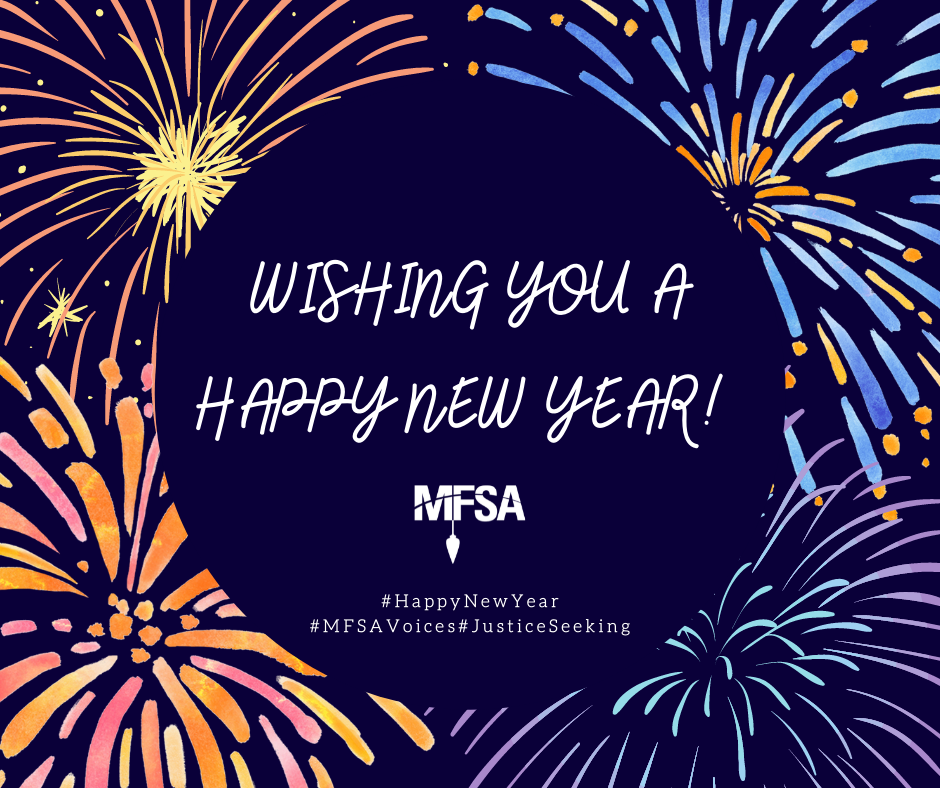 | Dear Justice-Seeker, Just wait.
That was the request of the institution when my congregation moved forward with officiating same-sex weddings. Wait for The Way Forward, wait for the next General Conference, wait, wait, wait...
Just wait.
That was the request of a handful of my white church members who didn’t feel it was the right time to talk about racism. Wait for us to be in a better place, wait for Covid to be over, wait, wait, wait...
Here we are in Advent, a season that isn’t so much about waiting as it is about anticipating. The call to wait for justice is often used as a tool of oppression. To anticipate, however, is to act while we wait to bring justice to fruition—to be justice midwives.
There will always be something to wait on—oppression thrives on that. It hopes that we lose interest or throw our hands up in frustration with comments like “this is too big” or “this is how it’s always been.” The only way forward is to anticipate, living into a future now that looks less like the present waiting church and more like Beloved Community centered in liberation. If you are waiting on the next General Conference or someone else to grant you permission, justice will never happen. Much like we prepare the church and ourselves for the birth of Jesus, we must anticipate, be justice midwives, preparing for the birth of the future church now.
That’s why MFSA is so important to me. Doing justice together, from the margins, keeps me grounded and connected in my justice work. We can’t do this work alone. The board members of MFSA will be the first to confess that we have not always gotten it right. Two years into our anti-racism audit has shown us that all the good intentions in the world poured into systems designed for oppression still birth harmful results. We are anticipating the future of MFSA and are preparing ourselves to work in more just and equitable ways.
Please join me in giving generously to this anticipating, life-giving, important work. Rev. Andy Oliver
MFSA Board President |
You make our collective work possible by your witness for justice every day in your church, community, and Annual Conference. MFSA does not receive any financial support from the United Methodist Church's giving channels. 100% of our budget is funded through your membership dues and your generosity in giving. | | | | | | | | | | | | | | Racial Audit Team Reflection I was asked to reflect on my experience with the MFSA Organizational Racial Audit. My reflection has something of a confessional nature. I share this not as self-flagellation or with an expectation of affirmation or sympathy, but in hopes that it will be helpful to others in reflecting on the depth of the work we are engaged in. I joined the MFSA Program Council around the same time the Board was committing to the Organizational Racial Audit. When I was invited to serve on the audit team, I was told it would be a 10-12 month process. The pandemic changed that , and it has now been two years since our initial training. More unexpected and more difficult, though, than conducting the audit through this pandemic time, has been the personal engagement and reckoning with White Supremacy. Before joining the audit team, I was aware of white supremacy in theory, and might have called myself an ally to Black, Indigenous, and People of Color. I had done little to engage white supremacy in an active, direct, or personal way. In particular, I still thought of white supremacy as something “out there,” and shielded myself from introspection with my work for justice and my association with religious leaders who were Black or People of Color. In the first year of the Organizational Racial Audit, we worked to establish a common language around white supremacy, create together a space to examine white supremacy culture in MFSA, and start collecting accounts and identify patterns of racism in MFSA’s history and present. Four months after the start of the audit, George Floyd was murdered by a police officer in Minneapolis. Floyd’s murder and the national uprisings that followed shifted the context in which I understood the audit, revealing more of the depth and urgency of active anti-racism work. That fall and winter, I participated in a study of Me and White Supremacy by Layla Saad with white members of the board and community at the Wesley Center in Iowa City. This study began to bring home to me the ways that white privilege, white fragility, and other facets of white supremacy work in me, personally. In my own life, I can see that I have often remained silent rather than risking by naming microaggressions when I see them. I have been “color-blind,” interacting with Black, Indigenous, and People of Color without acknowledging the important differences we have in culture and life experience. And my actions and inactions have made spaces hostile to the participation of Black, Indegenous, and People of Color and allowed white supremacy to persist. Now, two years into the audit, I still feel that I am only scratching the surface in my awareness and understanding of white supremacy. The subtly with which it reinforces itself, insulates white people, and marginalizes Black, Indigenous, and People of Color is devastating. I am grateful for the awareness that has come through this process, and feel the gravity of the work that is still ahead for me. Now that I have seen, I cannot ignore the presence of white supremacy in me or my context, nor the ways that white supremacy undermines my own efforts at creating the spaces I need. I believe that what I am learning about my own life has resonance for MFSA as an organization. I am convinced that any white justice organization that does not commit to anti-racism at a fundamental level will inevitably recreate the oppressions it seeks to oppose. This fundamental commitment must be greater than our commitment to survival, or we will lack the resolve to become accountable for our work or to follow through on the generous guidance of Black, Indigenous, and People of Color leaders and communities we claim to be in solidarity with. | | | | | | 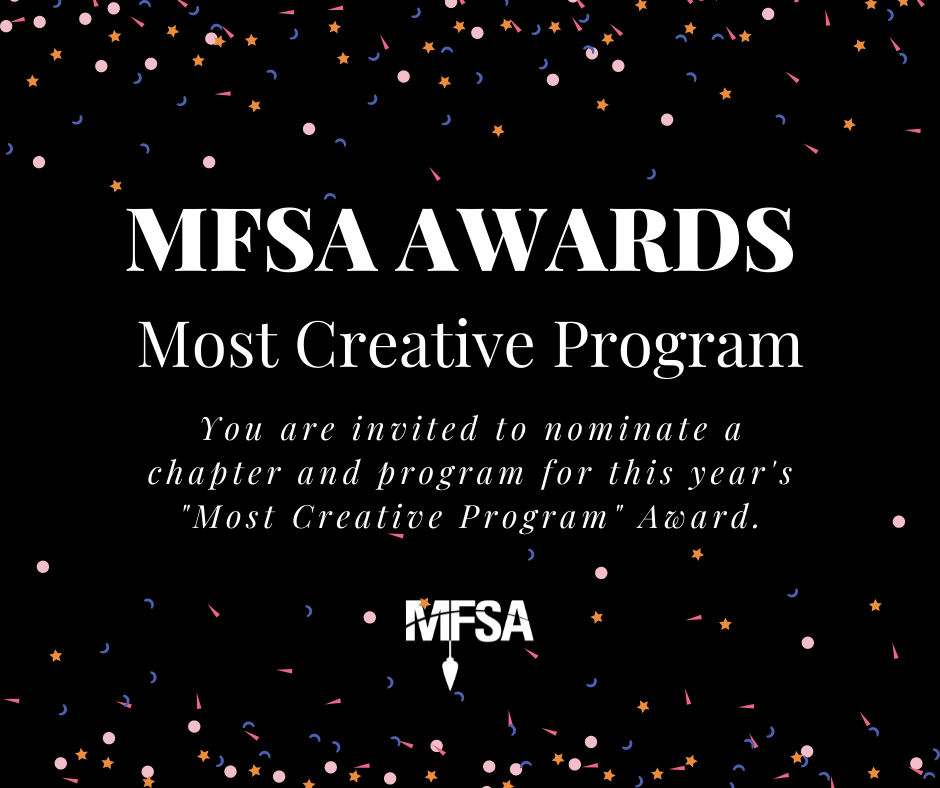 | | | | | 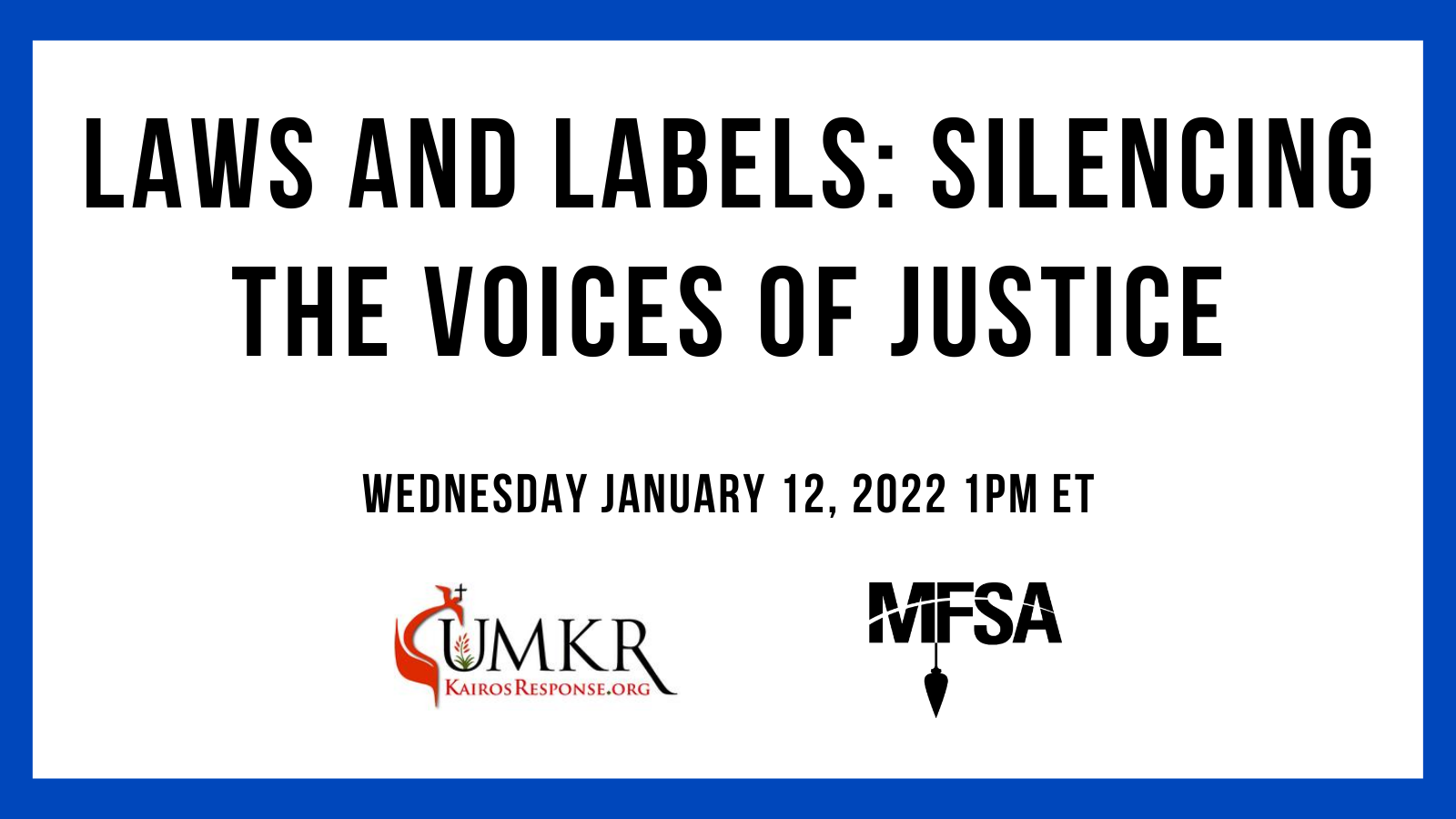 | Laws and Labels: Silencing the Voices of Justice
Wed Jan 12 1PM ET MFSA and United Methodists for Kairos Response (UMKR) will be hosting a panel discussion of Israel’s labeling of six Palestinian organizations as terrorists and the bigger picture of Israeli lawfare - manipulation of legislation, political labels, and their own judicial system to muzzle human rights defenders, violate universal rights with impunity and hide the reality of Israeli apartheid and brutal oppression. The panel will consider the history of harassment all these groups have endured and the methods Israel has been using against other prominent human rights defenders and humanitarian organizations. | | | | | | 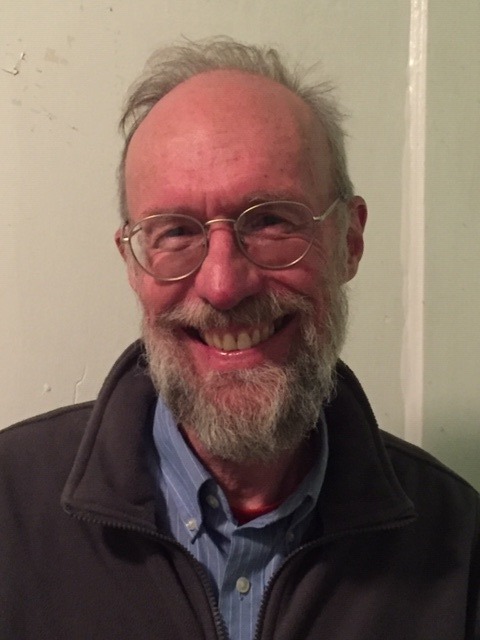 | Webinar Afghanistan Update Join us Wednesday, Jan 26th, 1pm Eastern/12pm Central/ 11am Mountain/ 10am Pacific to learn more about how we can work toward justice with our Afghan neighbors and hear updates. Speaker David Wildman serves as the liaison to the United Nations, the Middle East & Afghanistan for Global Ministries of the United Methodist Church. He has traveled regularly to Afghanistan since 2004. He has served with United Methodist general agencies since 1989 and his office is at the Church Center for the UN in New York City. | | | | | | 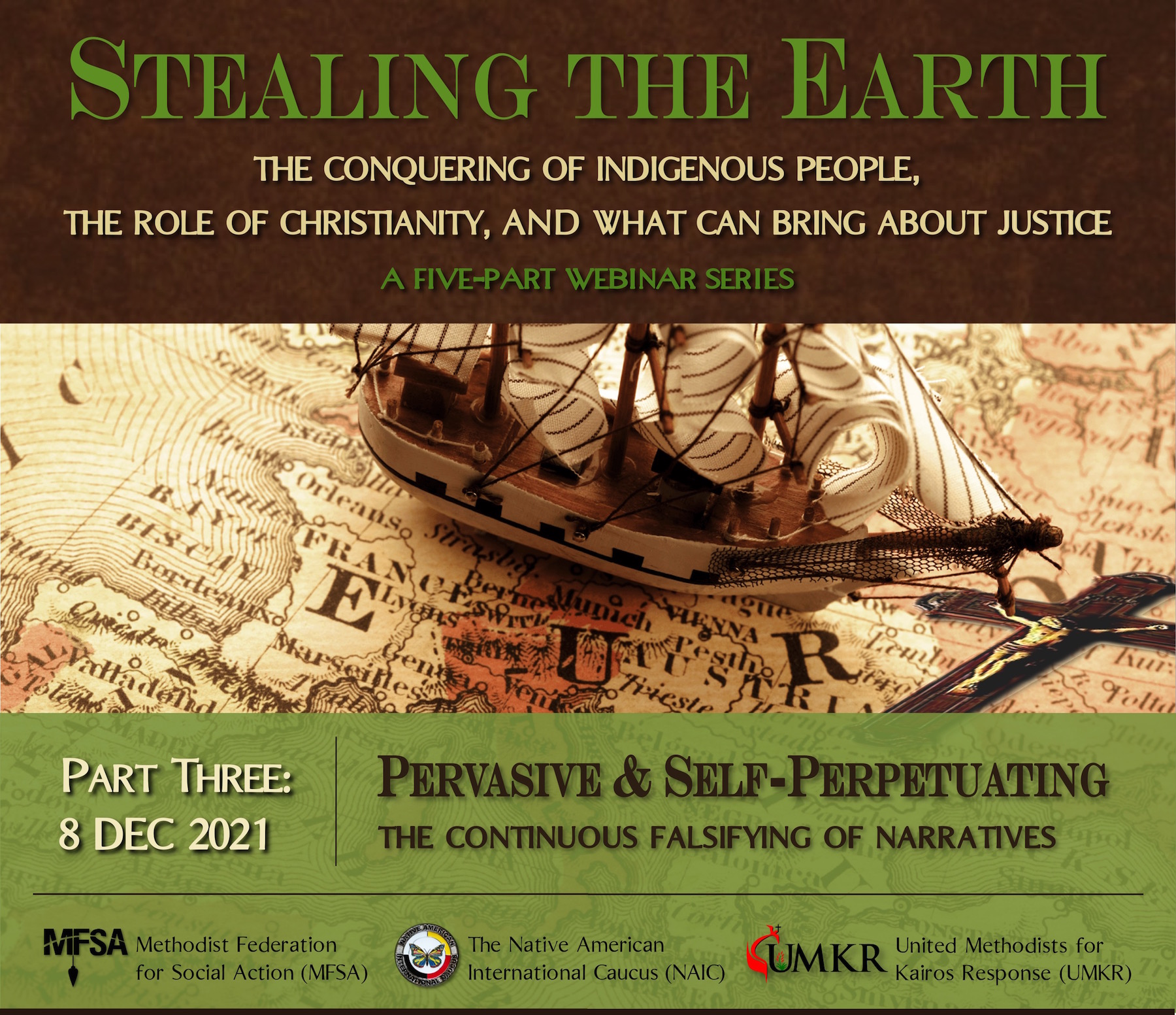 | Stealing the Earth Part 3: “Pervasive and Self Perpetuating:” The continuous falsifying of narratives. Check out the recording and resources from the part three in the five-part Stealing the Earth webinar series titled, "Pervasive & Self-Perpetuating: The Continuous Falsifying of Narratives." Save the Date: Part 4 “'Centering and Othering:' Elevating white normativity, suppressing racial and indigenous identities" will be on February 9, 2022 at 1PM ET. | | | | | | 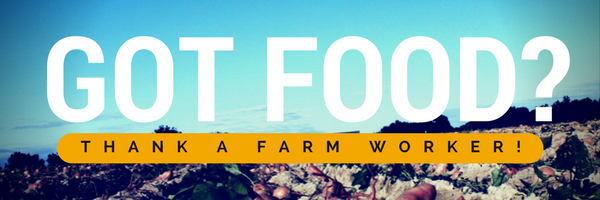 | Now's the Time for Action Here are a few ways you can seek justice and work for broad systemic change: - Sign up for Coalition of Immokalee Workers Fair Food mailing list to learn more about what you can do to advocate for farmworker rights.
- Contact your members of Congress and tell them to stop the use of Title 42 policy to deny Haitian migrants' rights to seek asylum, restore asylum protections, and stop all deportation flights and expulsions to Haiti.
- Urge your members of Congress to co-sponsor HR 2590: Defending the Human Rights of Palestinian Children and Families Living Under Israeli Military Occupation Act.
- Join the #WelcomeWithDignity movement by signing the pledge to reimagine the way our country and our communities treat people seeking safety.
- Contact your Senators and Representatives to pass common sense legislation that saves the lives of farm workers like the Asunción Valdivia Heat Illness and Fatality Prevention Act.
- In solidarity, join workers demanding $15/hr and tell McDonald’s to raise wages now.
- Check out what military acquired by your local law enforcement, and sign the petition to demanding more police transparency.
- Contact your elected officials and demand Congress cut funding for ICE and CBP and defund hate.
- Tell your Member of Congress to support the Accessible, Affordable Internet for All (AAIA) Act, an act that can help bridge the digital divide that disproportionately impacts Black, Latinx, Indigenous, rural, or low-income people.
- Write to the leadership of the township of Fairfield, CT to contact Sturm Ruger, the largest firearm manufacturer in the United States with headquarters in Fairfield, and demand the company suspend weapon and bullet sales to Israel.
- Tell President Biden and Vice President Harris to hold Israel accountable to its obligations as an occupying power and insist that Israel provide COVID-19 vaccines equally and fairly to Palestinians living under its occupation.
- Contact your elected officials to take an intersectional response to the incidents of AAPI hate and to center the needs of those most impacted, Asian American women and elders.
- Check the State Voting Bills Tracker to find out if your state lawmakers have introduced one of the 253 bills aimed at suppressing voting rights, and contact your state lawmakers to demand they support voting rights.
- Sign the petition and tell Congress to abolish the federal death penalty.
- Has your country signed on to the UN Treaty on the Prohibition of Nuclear Weapons? Contact your elected officials to support the end of nuclear weapons in the world.
- Check out the BDS Toolkit and learn what economic actions you can take to fight along the side of Palestinians and their struggle.
- Manufacturing in an illegal Israeli settlement is a war crime. Tell General Mills to stop making Pillsbury products on stolen Palestinian land by signing the petition, sending an email to the CEO, and #BoycottPillsbury.
- Write a letter and join the grassroots organizing for the rights of refugees, asylum seekers, and immigrants.
- Sign the petition and join Palestinian Cry for Hope: a Call to Decisive Action, a global movement set by Kairos Response that "rouses churches to action and awakens civil society to the reality of Palestinian suffering."
- Take free online university courses on systemic racism.
- Host a virtual Card Writing Party to write and mail letters to immigrants in detention via The Casa Mariposa Detention Visitation Program.
- Call your legislators (202-224-3121) and advocate for permanent federal paid sick leave, expanded unemployment benefits, SNAP increases, and a moratorium on evictions, utility shut-offs, and payments.
| | | | | | | | 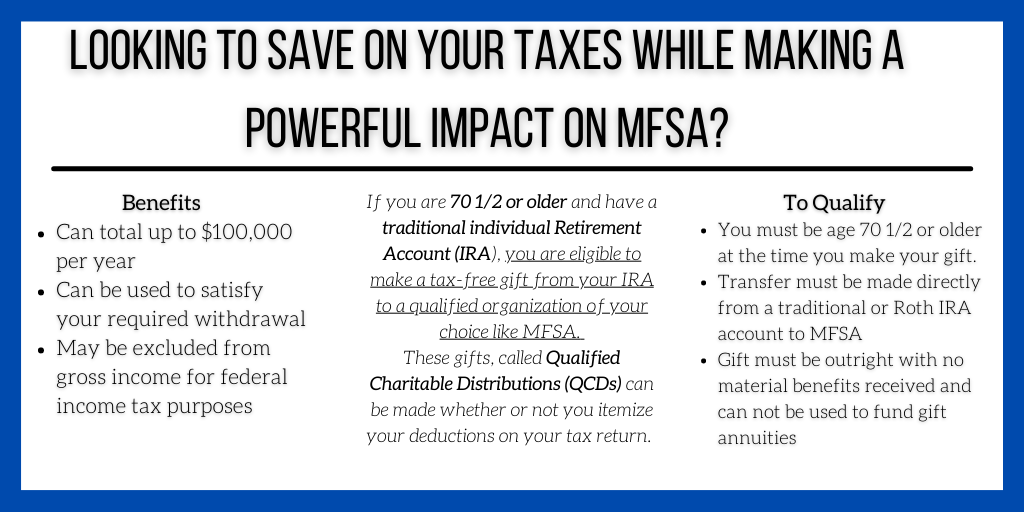 | | | | | 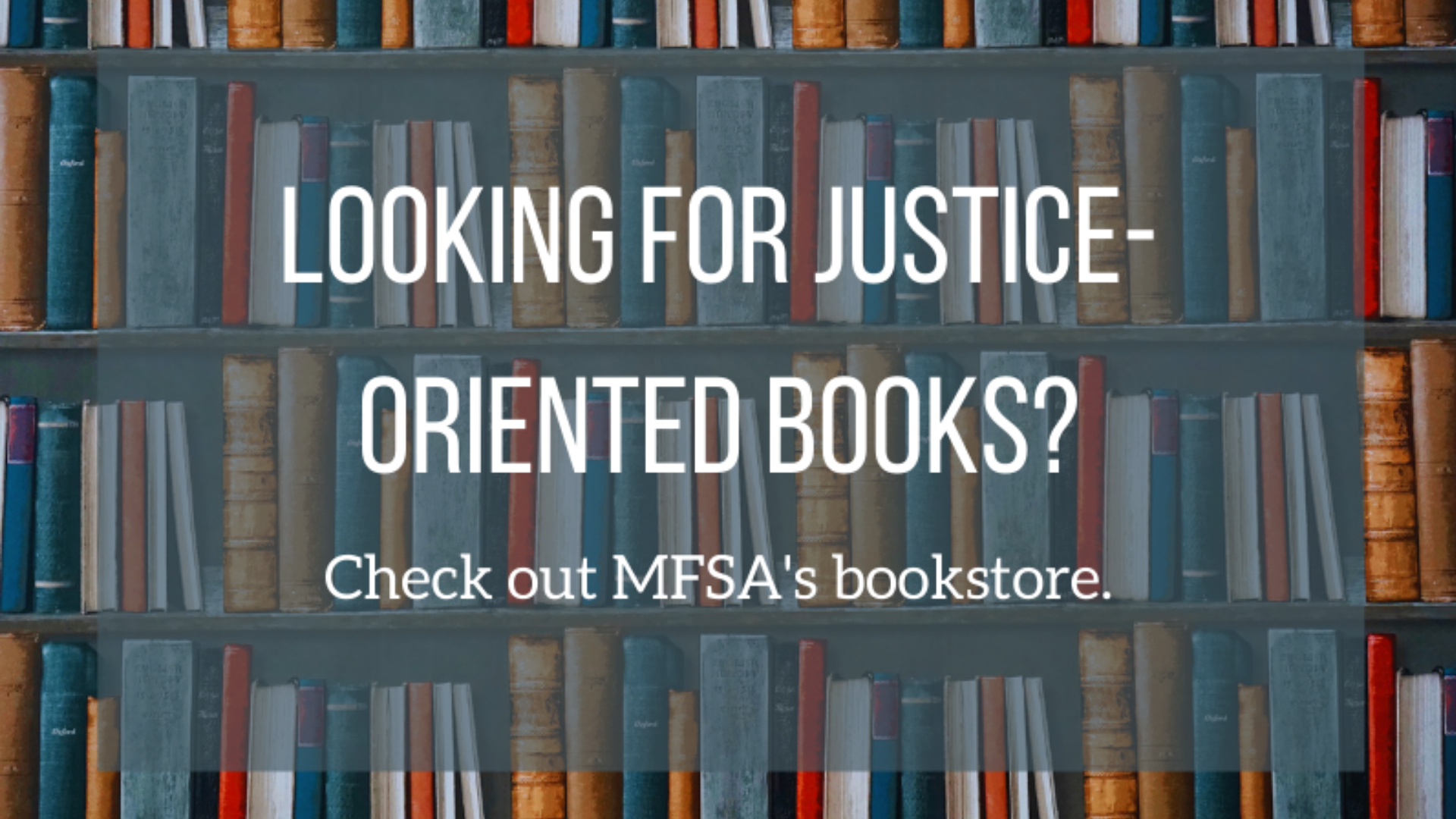 | | | | |  | | | | | Contact Us Methodist Federation for Social Action
23 East Adams Ave
Detroit, Michigan 48226
(313) 965-5422 ext 121
bridget@mfsaweb.org | | | | | | | |